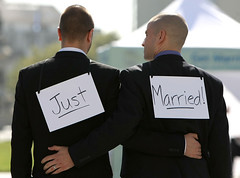
Photo from theblaze.com: Two men just married in Washington state
Nathan Crites-Herren
The Paw Print
Washington is set to become the seventh state to legalize same-sex marriage. On March 4 the State House of Representatives voted 55-43, largely along partisan lines, in favor marriage equality legislation just one week after it was passed by the state’s Senate. Governor Christine Gregorie, a public advocate for same-sex marriage, is expected to sign the measure into law next week. “As governor, I believe the state of Washington cannot be in the business of discrimination. As an American, a wife and mother, marriage equality is fair, just and right, and it’s time,” said Gregorie.
The same-sex marriage bill was modeled after a similar bill approved in New York in June. It allows churches and religious institutions to choose not to perform marriages to same-sex partners and to deny access to their churches and properties to perform the marriage ceremony.
Despite the rights reserved for religious institutions, Republican State Representative Jim McCune bemoaned the recent ruling saying, “No one in this state has the right to change the definition of marriage. The bill casts aside one of the greatest cornerstones of our society, the family unit, which starts with a father and a mother.”
In response to the bill, opponents of same sex-marriage are working to collect 120,000 signatures to prevent the measure from going into effect immediately. Upon gathering the required amount of signatures, the measure will be put to a public referendum, in which a vote would be taken by members of Senate and House comities to determine the standing of the measure.
The recent vote in Washington follows the recent historic decision by California’s lawmakers to overturn the controversial Proposition 8, which had outlawed same-sex marriage in 2008. Commenting for the majority on the California ruling, Judge Stephen Reinhardt stated, “Proposition 8 serves no purpose, and has no effect, other than to lessen the status and human dignity of gays and lesbians in California, and to officially reclassify their relationship and families as inferior to those of opposite-sex couples.”
Maryland, New Hampshire, Minnesota, North Carolina and New Jersey have also begun the voting process to legalize same-sex marriages in their respective states. In the past 10 years, the struggle for same-sex rights has been largely headed by non-profit social organizations ranging from those that focus solely on the right for same-sex marriage to broader issues of equality and justice.
Although jubilation has been expressed across the LGBTQ (Lesbian, Gay, Bi-sexual, Transgender and Queer) community over the recent decisions in Washington and California, some in that community are critical over the amount of attention paid to same-sex marriage.
Kali Cohen, a transgender community organizer, founder of the Los Angeles Transgender Film Festival feels that the focus on same-sex marriage has taken energy away from further activism dealing with issues of discrimination towards the LGBTQ community. “My biggest concern is how much resources in the LGBTQ movement have been funneled towards marriage equality alone, and away from basic survival that a lot of LGBTQ people still face, such as lack of access to education, healthcare, housing and criminal justice reform,” said Cohen. Cohen and others in the LGBTQ movement are also concerned that the focus on same-sex marriage is mostly benefiting the affluent lesbian and gay community, mostly white peoples, while the most vulnerable LGBTQ peoples are marginalized in favor of the same-sex marriage issue.
What’s Been Said…